Columban Fr Daniel Fizgerald: 100 years old today!


The Just Judge Saves the Innocent
by Fr Shay Cullen
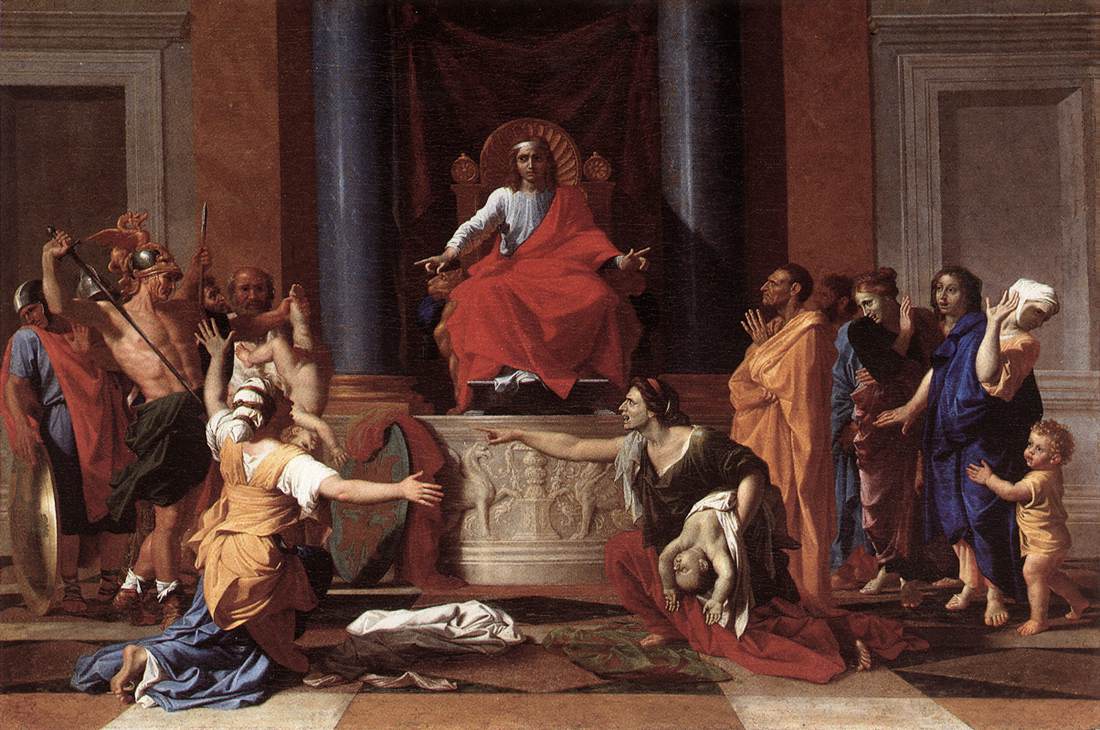
The Judgment of Solomon, Nicolas Poussin, 1649
Musée du Louvre, Paris [Web Gallery of Art]
The Philippines is moving away from an era of compassion and justice to one where the innocent are targets for assassination and wrongful imprisonment on false charges. In recent weeks dozens of bodies have been found shot dead with signs pinned on the bodies, declaring them criminals deserving of death. But there was no trial, no justice. The killers have contempt for the process of justice.
Street children are sometimes set up by dru- pushers as delivery boys and are arrested and criminalized. They might be shot, too. Journalists have been declared by some high officials to be deserving of assassination. Travelers both Filipinos and foreigners have been set up with bullets and cannabis planted in their bags at Philippine airports. Unless they pay bribes on the spot, they will be charged with a crime. Now you see travelers having their bags totally wrapped in cling-plastic before checking in.
Some corrupt police and officials have no respect for the system of justice and treat it with contempt. When they frame up someone with a false charge, the good judge of integrity proves them wrong and the victim is declared innocent. The judge of integrity thwarts the corrupt with true justice and the rule of law.
One foreign visitor in Olongapo, call him Frank, was allegedly set up by a police captain who stole his expensive camera. When he demanded it back and asked for justice, he was charged by the police with child abuse and jailed without bail. He would never pay anything to have the charges dropped as he believes he is innocent. He has hope in the system of justice and is fighting for his freedom. He suffers greatly and has a rare form of diabetes and needs special insulin only available in Europe. He will surely die if he does not get it and supplies are running out.
Full post here.

The Disrobing of Christ (El Espolio), El Greco, 1577-79
Sacristy of the Cathedral, Toledo, Spain [Web Gallery of Art]
Readings (New American Bible: Philippines, USA)
Readings (Jerusalem Bible: Australia, England & Wales, India [optional], Ireland, New Zealand, Pakistan, Scotland, South Africa)
Gospel Luke 9:51-62 (New Revised Standard Version, Catholic Edition, Canada)
When the days drew near for Jesus to be taken up, he set his face to go to Jerusalem. And he sent messengers ahead of him. On their way they entered a village of the Samaritans to make ready for him; but they did not receive him, because his face was set toward Jerusalem. When his disciples James and John saw it, they said, “Lord, do you want us to command fire to come down from heaven and consume them?” But he turned and rebuked them. Then they went on to another village.
As they were going along the road, someone said to him, “I will follow you wherever you go.” And Jesus said to him, “Foxes have holes, and birds of the air have nests; but the Son of Man has nowhere to lay his head.” To another he said, “Follow me.” But he said, “Lord, first let me go and bury my father.” But Jesus said to him, “Let the dead bury their own dead; but as for you, go and proclaim the kingdom of God.” Another said, “I will follow you, Lord; but let me first say farewell to those at my home.” Jesus said to him, “No one who puts a hand to the plow and looks back is fit for the kingdom of God.”

Columban Fr Rufus Halley (1944 – 28 August 2001) with friends in Mindanao
Jesus speaks clearly to us in Sunday’s gospel about the cost of following him. Christians are still prepared to give up their very lives to follow Jesus. One example is Fr Franҫois Mourad, a Catholic priest, murdered in Syria on 23 June 2013, as Vatican Radio reports.

Fr Franҫois Mourad [AsiaNews.it]
One who paid the same price, on 28 August 2001 in the Philippines, was a very close friend and Columban confrere, Fr Rufus Halley, from County Waterford in Ireland. He entered the Columbans one year after me. Father Rufus came from a relatively wealthy family but lived very simply and chose to spend the last twenty years of his life in a predominantly Muslim area in Mindanao, an area where for centuries there has been distrust, and sometimes open hostility, between Christians and Muslims.
Many of us tend to react as James and John did in a ‘them and us’ situation. Not Father Rufus. He chose the path of dialogue, learning two new Philippine languages in order to do that – he was fluent in Tagalog, the language spoken in central Luzon where he had worked for many years – Maranao, the language of most of the Muslims in Lanao del Sur where he was based, and Cebuano, the language of most of the Christian minority there.
He was ambushed and shot dead while riding back to his parish in Malabang from the neighbouring parish of Balabagan. He had been at a meeting of Christian and Muslim leaders. Though the killers happened to be Muslims, both Christians and Muslims mourned him.
Here is an article written by a great friend of Father Rufus, who was known to many as ‘Father Popong’, Gaudencio Cardinal Rosales, Archbishop Emeritus of Manila, published in Misyon in August-September 2006. I’ve made some minor changes in the text.

A young Bishop Rosales, seated, 2nd from left, with Fr Bernard Jagueneau of the Little Brothers of Jesus, 1st left, another close friend of Father Rufus
Pareng Rufus
By Gaudencio B. Cardinal Rosales
The author, after ten years as Archbishop of Lipa, his native diocese, was appointed Archbishop of Manila by Pope John Paul II on 15 September 2003 and created cardinal by Pope Benedict XVI on 24 March 2006. He retired on 13 October 2011.
I first met Father Rufus Halley in the mid-1970s when I was appointed auxiliary bishop in Manila with responsibility for Rizal Province, the area that became the Diocese of Antipolo in 1983. The Columbans had been working in parishes there since before the War. Father Rufus was in Jalajala at the time. Father Feliciano Manalili, a diocesan priest, introduced me to him. Father Manalili is now a Trappist monk in Mepkin Abbey, South Carolina, USA, where he is prior.
New friend
At first I knew Father Rufus in a formal way, as one of the parish priests under my jurisdiction. But I gradually began to know this man with an open personality and a wonderful sense of humor as a person. On one occasion he invited me to a barrio in his parish that was 45 minutes by boat from the centro. He had forewarned me that this would be a different kind of pastoral visit. We set off in the afternoon. The house where we stayed was on a duck farm and some of the birds were waddling around the house. There was no electricity. After dinner we walked around the village. I saw the people at their usual occupations that included drinking and gambling games such as bingo. Father Rufus introduced me as ‘my friend from Manila,’ which wasn’t untrue, as we were in the Archdiocese of Manila.
Back at the house we chatted for a long time and prayed together. We decided we’d celebrate Mass the next day back at the centro. We slept on the floor. As we were leaving next morning people came to see us off and it was only then that their parish priest told them that I was the area bishop. Though there was some embarrassment, especially among those who were members of Church organizations, there was a lot of laughter at the realization that the bishop had met them as they really were.
Tagalog-speaking Irishman
By this time Father Rufus and I were close friends and I called him ‘Pareng Rufus’ and he called me ‘Pareng Dency.’ I felt free to drop in on him at any time and to go through the back door of his convento(presbytery/rectory). Sometimes I wouldn’t find him in the office or upstairs and would then realize that, despite his red hair and blue eyes, I had passed him in the kitchen, where he was chatting with the staff. (His baptismal name was Michael but his parents always called him ‘Rufus’ because of his red hair). What threw me was that I’d hear only pure Tagalog while walking through the kitchen. My Irish friend spoke the language perfectly.
Another trademark of Father Rufus was his bakya (wooden clogs). I learned from the late Father Patrick Ronan, then parish priest in Morong, that Father Rufus came from a privileged background. That was a revelation to me, as I had always been struck by the simplicity I saw in his life. Father Ronan, another Irish missionary with a great sense of humor and known to his fellow Columbans as ‘Pops’, had spent time in jail in China after the Communist takeover in 1949.
Around 1980 Father Rufus felt called by God to leave the security of living in an overwhelmingly Catholic community to work in the new Prelature of Marawi, which includes all of Lanao del Sur and part of Lanao del Norte, where 95 percent of the people are Muslims. He was very aware of the long history of tension and occasional outright conflict between Christians and Muslims. He also became fluent in two other languages, Maranao, spoken by the Muslims in the area, and Cebuano, spoken by the Christians.

Bishop Gaudencio B. Rosales when Auxiliary Bishop of Manila (1970s)
His kind of dialogue
I too moved to Mindanao, becoming Coadjutor Bishop of Malaybalay in 1982 and succeeding Bishop Francisco Claver SJ in 1984. On one occasion, after spending about a week on retreat in the Benedictine Monastery of the Transfiguration in Malaybalay, Pareng Rufus came to spend a night at my place. He spoke of a ‘brother Muslim’ whom he loved very much and told me that he had been hired to work in a store in the market in Malabang, Lanao del Sur. ‘Why?’ I asked him. ‘This is my kind of dialogue,’ he told me. He was pushing Christian-Muslim dialogue to the limit. When the late Bishop Bienvenido Tudtud, first bishop of the then Prelature of Iligan, which covered the two Lanao provinces, told Pope Paul VI of the conflict there and of his vision of a ‘dialogue of life’ between the two communities, the Pope encouraged him to the extent of dividing the prelature and transferring him to Marawi. Bishop Tudtud died tragically in a plane crash in 1987.

Fr Rufus Halley
Male-dominated Maranaos
My friend Rufus wanted not only to know the faith and culture of Muslims but to ‘befriend the culture of our brother Muslims.’ More than that, he wanted to understand the culture of the Maranaos. This involved trying to understand aspects of that culture that went against his own warm nature and that didn’t seem to be in harmony with the Gospel. For example, he noticed that among Maranao men it wasn’t seen as proper to show any public signs of softness, even if a child of theirs was hurt. He noticed how stiff Maranao men are in their dances which many Filipinos are familiar with. Men sometimes carry a kris as a sign of power. He was well aware that many men, Christian and Muslim, carry a gun for the same reason, and not only in Lanao. He asked himself if there were any areas of tenderness in the macho culture of the Maranaos and stressed the importance of trying to find ways in which the Gospel could enter into dialogue with that culture.
Pareng Rufus was really educating me that night.
Who inspired him

Blessed Charles de Foucauld, c.1907 [Wikipedia]
I knew of the intensity with which Father Rufus lived his own Christian faith, how he began each day with an hour of adoration before the Blessed Sacrament, the centrality of the Mass in his life. A big influence on him was the life of Blessed Charles de Foucauld, 1858-1916, beatified on 13 November 2005. This Frenchman was also from a privileged background. Unlike Pareng Rufus, he lost his Catholic faith and became a notorious playboy before re-discovering it, partly through the example of Muslims living in North Africa. He spent many years as a priest living among the poorest Muslims in a remote corner of the Sahara, pioneering Christian-Muslim dialogue by discovering himself as the Little Brother of Jesus in the Blessed Sacrament and as the Little Brother of the Muslims who came knocking at his hermitage door.

Hermitage of Blessed Charles de Foucauld, Algeria [Wikipedia]
Death of a peacemaker
On 1 December 1916 Charles de Foucauld died at the hands of a young gunman outside his hermitage and on 28 September 2001 Pareng Rufus died at the hands of gunmen who ambushed him as he was riding on his motorcycle from a meeting of Muslim and Christian leaders in Balabagan to his parish in Malabang. The local people, both Christian and Muslim, mourned for him deeply. The grief of the Muslims was all the greater because the men who murdered my Pareng Rufus happened to be Muslims. This great missionary priest brought both communities together in their shared grief for a man of God, a true follower of Jesus Christ.
Entrance Antiphon Psalm 46 (47):2
All people, clap your hands.
Cry to God with shouts of joy!
Antiphona ad Introitum (Ps 46 (47):2 [Latin]
Omnes gentes, plaudite manibus,
iubilate Deo in voce exsultationis.
The video above is a setting of the Entrance Antiphon in Latin by contemporary Croatian composer Branko Stark. It is sung by The Thai Youth Choir. In Thailand the vast majority of people are Buddhists. The setting also includes verses 3, 6 and 7 of the psalm:
| Quoniam Dominus Altissimus (excelsus), terribilis, rex magnus super omnem terram.
|
Helping the New President Fight Crime
By Fr Shay Cullen

There is a wise saying, ‘Be careful of what you promise. People might believe it.’
By June 30 the Philippines will have sworn in a new president, Rodrigo Duterte – famous for his somewhat exaggerated style of speaking and for making election promises to eradicate crime and corruption in three to six months after his inauguration.
He could still make a strong impact in reducing crime and start to fulfill his promises with smart lawful executive orders and legislation and by stopping killings by death squads and vigilantes. He can stop officials paying bonuses to rogue police for killing mere suspects. That’s a license to violate human rights and kill with impunity. It’s not worthy of a people as great as Filipinos, who have suffered from weak and corrupt leadership in the past.
Those who understand how deep the roots of crime and corruption are in the Philippines will know that the well-meaning candidate, now President-elect Rodrigo Duterte – made promises as the basis of his presidency that are almost impossible to fulfill. But the impossible may still be possible.
Many people have taken these promises seriously and they will be expecting results. We have to help the new president succeed in fighting corruption and criminality within the law. The killing of suspects is not the way. That will bring down international condemnation and shame and the Philippines will be the pariah of the civilized world. The Secretary General of the United Nations has spoken against Philippine death squads killing journalists already. If the vigilantes have their way, the presidency will be gravely affected and branded as a killer regime and violator of human rights. Filipinos will lose respect wherever they are in the world. That must not happen. We must help the president succeed by implementing the strict rule of law.
Full post here.
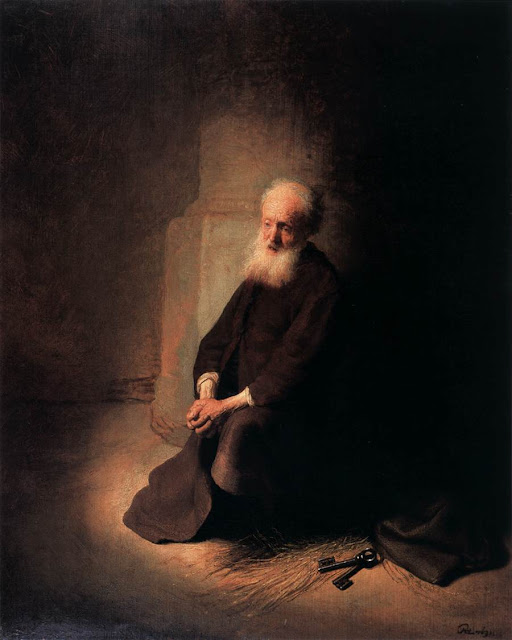
Apostle Peter in Prison, Rembrandt, 1631
Israel Museum, Jerusalem [Web Gallery of Art]
Readings (New American Bible: Philippines, USA)
Readings (Jerusalem Bible: Australia, England & Wales, India [optional], Ireland, New Zealand, Pakistan, Scotland, South Africa)
Gospel Luke 7:9:18-24 (New Revised Standard Version, Catholic Edition, Canada)
Once when Jesus was praying alone, with only the disciples near him, he asked them, “Who do the crowds say that I am?” They answered, “John the Baptist; but others, Elijah; and still others, that one of the ancient prophets has arisen.” He said to them, “But who do you say that I am?” Peter answered, “The Messiah of God.”
He sternly ordered and commanded them not to tell anyone, saying, “The Son of Man must undergo great suffering, and be rejected by the elders, chief priests, and scribes, and be killed, and on the third day be raised.”
Then he said to them all, “If any want to become my followers, let them deny themselves and take up their cross daily and follow me. For those who want to save their life will lose it, and those who lose their life for my sake will save it.

Sir Thomas More, Hans Holbein the Younger, 1527
Frick Collection, New York [Web Gallery of Art]
On 12 June 2013 the Taoiseach (Prime Minister) of the Republic of Ireland stated in the Dáil (parliament) in the context of legislation that the government eventually pushed through that allows abortion in certain situations: I am proud to stand here as a public representative, as a Taoiseach who happens to be a Catholic but not a Catholic Taoiseach. A Taoiseach for all of the people – that’s my job.
A number of columnists and writers of letters to the editor in Ireland praised Mr Kenny for this and contrasted it with words spoken by Labour TD (Member of Parliament) Brendan Corish in the Dáil in 1953: I am an Irishman second, I am a Catholic first, and I accept without qualification in all respects the teaching of the hierarchy and the church to which I belong. This statement has been frequently, incorrectly attributed to a previous Taoiseach of the same Fine Gael party as Mr Kenny, John A. Costello. However, Mr Costello, as Taoiseach, said in 1951: I, as a Catholic, obey my Church authorities and will continue to do so, in spite of The Irish Times or anything else . . .
Today’s second reading, Galatians 3:26-29) is very relevant to all of this, and not only in Ireland. St Paul says to us: for in Christ Jesus you are all children of God through faith. As many of you as were baptized into Christ have clothed yourselves with Christ. There is no longer Jew or Greek, there is no longer slave or free, there is no longer male and female; for all of you are one in Christ Jesus. And if you belong to Christ, then you are Abraham’s offspring, heirs according to the promise. (NRSV-CE).
Though the Second Reading on Sundays in Ordinary Time isn’t linked thematically with the Gospel, as the First Reading is, St Paul’s words tie in with the question Jesus put to the Apostles and puts to us now: But who do you say that I am?
Who is at the center of my life? Pope Benedict frequently reminded us that our faith is above all in a Person, Jesus Christ, God who became Man. And Pope Francis, in his homily on the Solemnity of the Body and Blood of Christ (Corpus Christ) 2013 said, So let us ask ourselves this evening, in adoring Christ who is really present in the Eucharist: do I let myself be transformed by him? Do I let the Lord who gives himself to me, guide me to going out ever more from my little enclosure, in order to give, to share, to love him and others?

1955 All-Ireland Football Final program [Wikipedia]
St Paul’s words challenge us to ask ourselves, ‘What is my deepest identity?’ We have many levels of identity, each of which has its own importance. I remember my first All-Ireland Football Final in Croke Park, Dublin, in September 1955. Dublin were playing against Kerry. I was there, aged 12 and standing on an orange-box, with my father, John, like myself a true ‘Dub’, and a neighbour and friend just a few doors up the street, Denis Stritch, who died in 2013, God rest his soul. Denis was from Kerry. During the game, the result of which was disappointing for me and my Dad, we identified with Dublin and Kerry, rivals but not enemies.
But if Denis and my Dad had ever visited me in the Philippines they would have identified themselves as Irish. However, if they had attended Mass in Bacolod City they would have identified themselves as Catholic Christians, as would everyone else present. As many of you as were baptized into Christ have clothed yourselves with Christ. There is no longer Jew or Greek . . .
This is our most basic identity. Have this mind among yourselves, which is yours in Christ Jesus, St Paul tells us in Philippians 2:5. When Jesus puts his question to the Apostles, But who do you say that I am? Peter answers clearly. The Messiah of God.
Whether I am a janitor or a journalist, a priest or a politician, I am called by my baptism to live out of my identity as a son or daughter of the Father, a brother or sister of Jesus, in the service of all my brothers and sisters. Pope Francis concluded his Corpus Christi homily with these words, Brothers and sisters, following, communion, sharing. Let us pray that participation in the Eucharist may always be an incentive: to follow the Lord every day, to be instruments of communion and to share what we are with him and with our neighbour. Our life will then be truly fruitful. Amen.
In most situations there is no conflict whatever between my various levels of identity. My being a Catholic Christian is not in conflict with my being an Irishman. But if I take my baptism seriously I can never leave ‘the mind of Christ’ at home or outside. In most areas of life Christians may legitimately disagree on issues while living their baptismal faith with all their hearts. Sometimes I have to yield on matters that I may not be happy with but that aren’t fundamental. Politicians, for example have to do this all the time, as do the rest of us on many occasions. But when it comes to matters of life and death I cannot, as a Christian, put the Gospel aside, as if ‘the mind of Christ’ was a T-shirt that I wear now and again.
St Thomas More (1478 – 1535), patron saint of statesmen, politicians and lawyers, whose feast day is this coming Wednesday, 22 June, gave his life because he put his identity as a Catholic Christian before anything else. Just before his execution he said, I die his Majesty’s good servant, but God’s first. He recognised his erstwhile friend King Henry VIII as King of England but not as head of the Church.
That was St Thomas’s response to St Paul’s words this Sunday, for in Christ Jesus you are all children of God through faith, to the question of Jesus, But who do YOU say that I am?
How do I answer that question?
Antiphona at introitum Entrance Antiphon Cf Ps 27[28]:8-9
Dominus fortitudo plebis suae,
The Lord is the strength of his people,
et protector salutarium Christi sui est.
a saving refuge for the one he has anointed.
Salvum fac populum tuum, Domine,
Save your people, Lord,
et benedict hereditati tuae,
and bless your heritage,
et rege eos usque in saeculum.
and govern them for ever.
Ad te, Domine, clamabo, Deus meus,
To you, 0 Lord, I call; 0 my God,
ne sileas a me:
be not deaf to me,
ne quando taceas a me,
lest, if you heed me not,
et assimilabor descendentibus in lacum.
I become one of those going down into the pit.
Gloria Patri et Filii et Spiritui sancto
Glory to the Father and to the Son and to the Holy Spirit
Sicut erat in principio et nunc et semper
As it was in the beginning, is now
Et in saecula saeculorum. Amen.
And will be for ever. Amen.
Dominus fortitudo plebis suae,
The Lord is the strength of his people,
et protector salutarium Christi sui est.
a saving refuge for the one he has anointed.
Salvum fac populum tuum, Domine,
Save your people, Lord,
et benedict hereditati tuae,
and bless your heritage,
et rege eos usque in saeculum.
and govern them for ever.
The video has the longer version of the Introit as used in the Mass in the Extraordinary Form, often referred to as ‘The Traditional Latin Mass’ or ‘TLM’. The text used in the Ordinary Form of the Mass is in bold, in Latin and in English.
Behind the Drug Culture is Child Neglect
by Fr Shay Cullen

St James, Andrea del Sarto, 1528-29
Galleria degli Uffizi, Florence, Italy [Web Gallery of Art]
A society without respect for and openness to accepting and listening to children and young people is like a land without water – everything dies.
Parents, relatives and enlightened community leaders are increasingly alarmed and shocked by the spread and common availability of personality- and mind-altering dangerous drugs. With the ‘internet-of-everything’ connecting everybody on smart phones, tablets, laptops and even eyeglasses, young people are exposed to a bombardment of influences more powerful, compelling and dangerous than ever before.
The role-model they see before them when entering adolescence has the greatest influence on their lives and self-image. The most important is the loving, caring parent who teaches by good actions as much as by positive words.
Young persons can be inspired and become a socially-involved and active youth helping others if listened to, involved in the life of the family, have good parents or brothers and sisters they can admire and imitate.
As busy parents get more involved with themselves and forget their children’s needs for friendship and companionship and leave them to themselves, then they could lose their child. Hundreds of thousands of children are running away from home and from unloving and abusive parents, more than ever before.
Full post here.

Feast in the House of Simon (detail), Paolo Veronese, 1567-70
Pinacoteca di Brera, Milan [Web Gallery of Art]
Readings (New American Bible: Philippines, USA)
Readings (Jerusalem Bible: Australia, England & Wales, India [optional], Ireland, New Zealand, Pakistan, Scotland, South Africa)
Gospel Luke 7:36 – 8:3 or 7:36-50 (New Revised Standard Version, Catholic Edition, Canada)
One of the Pharisees asked Jesus to eat with him, and he went into the Pharisee’s house and took his place at the table. And a woman in the city, who was a sinner, having learned that he was eating in the Pharisee’s house, brought an alabaster jar of ointment. She stood behind him at his feet, weeping, and began to bathe his feet with her tears and to dry them with her hair. Then she continued kissing his feet and anointing them with the ointment. Now when the Pharisee who had invited him saw it, he said to himself, “If this man were a prophet, he would have known who and what kind of woman this is who is touching him—that she is a sinner.” Jesus spoke up and said to him, “Simon, I have something to say to you.” “Teacher,” he replied, “speak.”
“A certain creditor had two debtors; one owed five hundred denarii, and the other fifty. When they could not pay, he canceled the debts for both of them. Now which of them will love him more?” Simon answered, “I suppose the one for whom he canceled the greater debt.” And Jesus said to him, “You have judged rightly.”
Then turning toward the woman, he said to Simon, “Do you see this woman? I entered your house; you gave me no water for my feet, but she has bathed my feet with her tears and dried them with her hair. You gave me no kiss, but from the time I came in she has not stopped kissing my feet. You did not anoint my head with oil, but she has anointed my feet with ointment. Therefore, I tell you, her sins, which were many, have been forgiven; hence she has shown great love. But the one to whom little is forgiven, loves little.” Then he said to her, “Your sins are forgiven.” But those who were at the table with him began to say among themselves, “Who is this who even forgives sins?” And he said to the woman, “Your faith has saved you; go in peace.”
[Soon afterwards he went on through cities and villages, proclaiming and bringing the good news of the kingdom of God. The twelve were with him, as well as some women who had been cured of evil spirits and infirmities: Mary, called Magdalene, from whom seven demons had gone out, and Joanna, the wife of Herod’s steward Chuza, and Susanna, and many others, who provided for them out of their resources.]
(Revised American Bible)
When I was parish priest of Lianga, Surigao del Sur, on the east coast of Mindanao for eleven months in 1993-94, there was no telephone in the town. The mayor’s big promise was, ‘By next year we will have a telephone’. It would be in the town hall. However, modern technology has since flourished and now almost everyone in Lianga has a mobile phone and some have access at home to the internet.
The only way of contacting the world outside of Lianga was by telegram. And outside of the larger cities in the country the telegram was essential, right up to the 1990s. Apart from being the only to convey personal news, telegrams were also a way of sending greetings. Among these were expressions of sympathy when someone died.
When Columban Fr James Moynihan, a New Zealander, died in 1992 in Cagayan de Oro City someone went to a telegraph office there to send a message of sympathy to the Columbans. The clerk taking the message was a young man with long hair. When he saw Father Jim’s name he asked the customer, ‘Is that the priest who was always hearing confessions in the Cathedral?’ ‘Yes.’ ‘Where is he being waked?’ ‘At the Cathedral’.
As soon as the transaction was finished the clerk left the office and went on his motorbike to the Cathedral to pay his respects to Father Jim. Clearly he had been one of his penitents. Father Jim, like other Columbans, ‘semi-retired’ after many years in parish work, spent many hours in the confessional almost every day in St Augustine’s Cathedral, Cagayan de Oro City. And they always had penitents, some of them from other parts of the Philippines. In the Redemptorist churches in the Philippines there are lines of penitents, especially on Wednesdays, when the Novena to Our Lady of Perpetual Help is held.
Today’s gospel is a beautiful expression of the sacrament of confession, which we also know as the sacrament of penance, of reconciliation. The woman was known to everyone as a sinner but she saw in Jesus someone she could trust, someone who would not use her or humiliate here. In a previous Sunday Reflections I’ve written about the former prostitute from the Philippines who spoke at the funeral Mass of King Baudouin of the Belgians in 1984. The King had been concerned about the lives of such women and had visited a brothel in Antwerp to sit with them and hear their stories. ‘He was the only man who ever listened to us’, the young woman said.
Pope Francis laments not being able to listen to confessions outside the Vatican. But on his first visit to one of the parishes in his new Diocese of Rome he heard some confessions before Mass. In his homily on Monday 29 April 2013 the Pope said this about confession: Humility and kindness are the framework of a Christian life. Oftentimes we think that going to confession is like going to the dry cleaners to get out a stain, but it isn’t. It’s an encounter with Jesus who waits for us to forgive us and offer salvation.
Clearly, the woman in the gospel wasn’t ‘going to the dry cleaners’ but went to Jesus whom she knew was waiting for her to forgive her and offer her salvation.
He is waiting for each of us to forgive us and offer salvation.
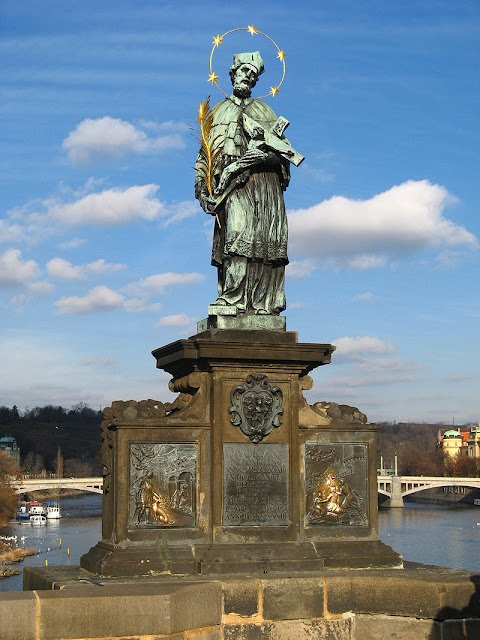
Statue of St John Nepomucene, Prague [Wikipedia]
St John Nepomucene is considered the first martyr of the seal of confession. He was thrown into the River Vlatva (Moldau) at the behest of King Wenceslaus because he wouldn’t divulge what the Queen had confessed.
+++
Vlatva (The Moldau) by Smetana, 1874
Boston Symphony Orchestra, conducted by Rafael Kubelík
The Charles Bridge in Prague from which St John Nepomucene was thrown can be seen in the video from 10:35 – 11:00. The statue of the saint is one of many on the bridge.
Beauty, whether that of the natural universe or that expressed in art, precisely because it opens up and broadens the horizons of human awareness, pointing us beyond ourselves, bringing us face to face with the abyss of Infinity, can become a path towards the transcendent, towards the ultimate Mystery, towards God. [Pope Benedict XVI]
The Criminals Behind the Drug Mafia
Fr Shay Cullen

Maria Rae was just 13 years old when she began to have a conflict with her aunt. She came from a broken home. She was abandoned when her parents split up. This is the great injustice and hardship suffered by the children of couples who come together without lasting love. They are driven more by impulse, have an unwanted child and then part ways and the child is abandoned.
So it happened that Maria Rae was left with her aunt who had children of her own and she was not cared for or loved. Maria Rae was a Cinderella kid. She was made to do the household chores but was not accepted by the family.
To find friendship, she wandered around the neighborhood in a town south of Manila looking for friends. She had dropped out of school when her parents separated. She lost the desire to learn and felt her life was already over and pointless. She was lonely and vulnerable. She was befriended by an adult man whom she called ‘Dada’.
He soon gave her money and gifts and she came to think Dada was the only person in the whole world that loved her. It was not love but grooming for abuse. He raped her and she had nowhere to run, no one to talk to and afraid to ask help.
He gave her pills, drugs of some kind. He then invited his friends to abuse her also. She was brought to hotels and sold for sex to the customers that Dada had lined up. They were drug users. The pedophiles love to get high on drugs while abusing children.
When her auntie learned that Maria Rae was being prostituted, she demanded a share of the payment. Dada refused and the aunt filed criminal charges for human trafficking against him. He was the local drug pusher, too, it seems as the sex industry is run on drugs. These drug dens of iniquity and abuse are fronts for drug trafficking and dealing. They control the young girls by getting them dependent on drugs.
Full post on Preda website.

Fr Vincent Batchelor died in Box Hill Hospital in Melbourne on 28 May at around 5:30pm in his 96th year. He had been living in Nazareth Care Camberwell, under the care of the Sisters of Nazareth. Camberwell is a suburb of Melbourne. Father Vincent had a fall after which the staff decided to send him to hospital for observation. The doctor suspected that the fall was brought on by a heart attack. He had been visited by his sister Mary and niece and Fr Ray Scanlon who kept in constant contact with him and with Fr Gary Walker, the Regional Director of the Columbans in Australia and New Zealand, that afternoon. He died shortly after they left.
Gunbower Creek, Cohuna, Victoria [Wikipedia]
Vincent Batchelor was the fifth child in his family of five brothers and four sisters who grew up in Cohuna, in country Victoria on the Victorian side of the Murray River.
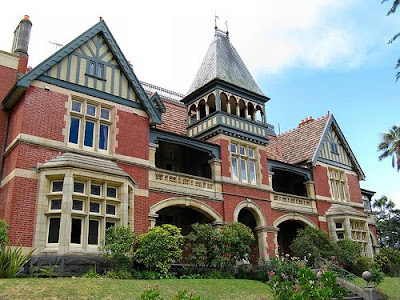
He joined the Columbans in 1938 and did his Spiritual Year and philosophy at St Columban’s, Essendon (above), a suburb of Melbourne, but had to travel to St Columban’s, Omaha, Nebraska, USA (below), for theology in 1941 where he was ordained on 21 December 1944.

On returning to Australia Fr Vincent held a variety of roles: Asian students’ chaplain, parish work, Director of Spiritual Year for Columban seminarians. In 1967 he was appointed to Fiji where he stayed for 40 years serving in parishes, as a teacher and chaplain to Xavier College in Ba and chaplain to the De Montfort Brothers who took over Xavier College from the Columbans. His work as a hospital chaplain was legendary. He returned to Australia and retired to St Columban’s, Essendon, until he needed nursing care.
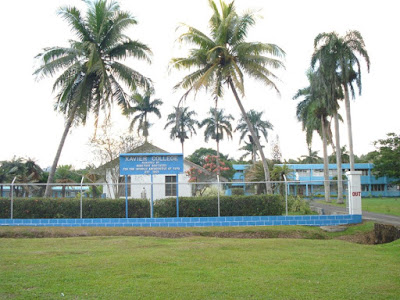
Xavier College, Ba [Facebook]
He had little interest in money or possessions and once sold his car after a cyclone in Fiji to buy food and essentials for people who had lost everything. He was clear in his desire to be a missionary, always willing to accept whatever appointment was asked of him. He was childlike in the best sense and God’s word was revealed in him as the many emails we have received testify.
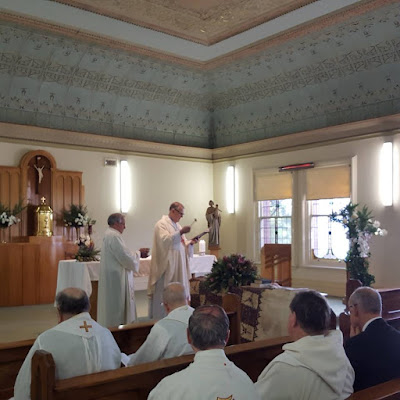
Funeral Mass
His funeral was on Thursday morning 2 June at the chapel in St Columban’s, Essendon; he was buried in the Columban plot at Melbourne General Cemetery. His coffin was wrapped in ‘tapa’ a traditional barkcloth used in the Pacific on important occasions such as burial. Fijian people sang hymns at the chapel and the graveside. It was very appropriate. May he rest in peace.

Burial
Singing during Mass, Fiji
Obituary by Fr Gary Walker, Columban Regional Director, Australia and New Zealand.
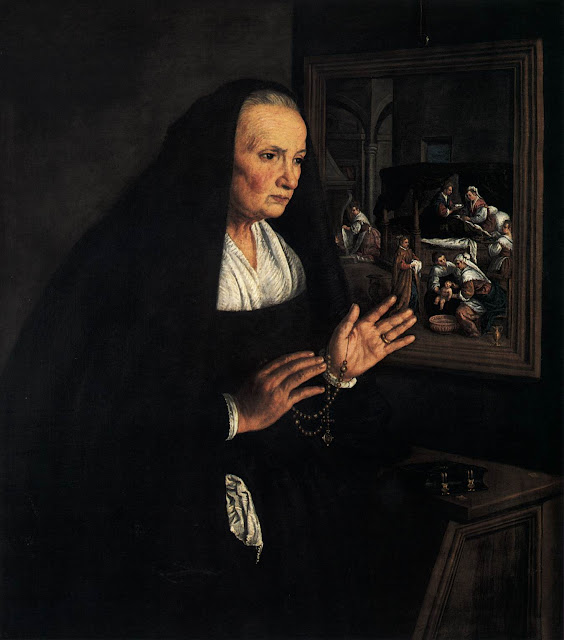
Portrait of a Widow at her Devotions, Leandro Bassano
Private Collection [Web Gallery of Art]
Readings (New American Bible: Philippines, USA)
Readings(Jerusalem Bible: Australia, England & Wales, India [optional], Ireland, New Zealand, Pakistan, Scotland, South Africa)
Gospel Luke 7:11-17 (New Revised Standard Version, Catholic Edition, Canada)
Soon afterwards he went to a town called Nain, and his disciples and a large crowd went with him. As he approached the gate of the town, a man who had died was being carried out. He was his mother’s only son, and she was a widow; and with her was a large crowd from the town. When the Lord saw her, he had compassion for her and said to her, “Do not weep.” Then he came forward and touched the bier, and the bearers stood still. And he said, “Young man, I say to you, rise!” The dead man sat up and began to speak, and Jesus gave him to his mother. Fear seized all of them; and they glorified God, saying, “A great prophet has risen among us!” and “God has looked favorably on his people!” This word about him spread throughout Judea and all the surrounding country.

Nein, Israel (Nain, Naim) [Wikipedia]
Back in the late 1970s when I was working in St Mary’s Seminary, Ozamiz City, in northern Mindanao – an island that is bigger than Ireland – I used to celebrate Mass in one of the barrios (villages) nearby. There was one elderly woman who was there every Sunday but who never smiled, never greeted me. I filed her away in my mind under ‘Grumpy Old Women’.
But on the Sunday that today’s gospel was read the idea came into my mind of inviting all the widows in the congregation for a special blessing at the end of Mass. My ‘Grumpy Old Woman’ came up, along with others, with a huge smile on her face. Every Sunday after that she greeted me as if I was her long lost son.
On Friday 7 June 2013, the Solemnity of the Most Sacred Heart of Jesus, Pope Francis spoke about the tenderness of God: Tenderness! But the Lord loves us tenderly. The Lord knows that beautiful science of caresses, the tenderness of God. He does not love us with words. He comes close – closeness – and gives us His love with tenderness. Closeness and tenderness! The Lord loves us in these two ways, He draws near and gives all His love even in the smallest things: with tenderness. And this is a powerful love, because closeness and tenderness reveal the strength of God’s love.
On 1 June 2013 twenty-two children being treated for cancer in the Agostino Gemelli Hospital in Rome came to visit Pope Francis. They recited the Hail Mary together and the Pope blessed them. He explained that his blessing is like a hug from God. A friend of mine in the Philippines who is a single mother once brought her cousin to meet me and told me later that her cousin had described the blessing I gave them in those very same words.
My ‘Grumpy Old Woman’, through the blessing I gave the widows at the end of Mass, experienced something of God’s tenderness, a ‘hug from God’, and it transformed her. It gave her a sense that she mattered to God as did the widow in today’s gospel whose only son was returned to her, as did the widow in today’s First Reading who offered hospitality to Elijah and whose son was returned to her.
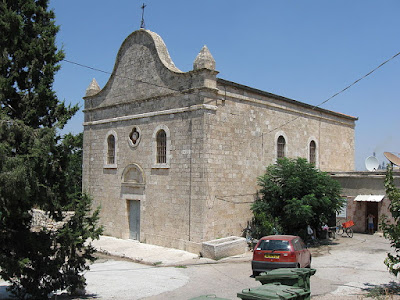
Widow’s Son Church, Nain [Wikipedia]
On 31 May 2013 Zenith.org told the extraordinary story of Pietro Maso, a young Italian who murdered his parents, Antonio and Rosa, in 1991 and how he was reconciled with his two sisters, Laura and Nadia, whom he had also tried to kill, I was dead and forgiveness resurrected me. It’s a story that shows the truth of the words of Pope Francis above, And this is a powerful love, because closeness and tenderness reveal the strength of God’s love.
Pietro was released from prison in Milan in April 2013 after serving 22 years. During his first year in jail he heard Fr Guido Todeschini speak about him on the radio: What do we do, do we abandon him, do we bury him alive as he deserves or do we stretch our hand out to him and try to rescue him, taking into account his young age? Of course, at this moment it’s easier to be executioners than to be moved to pardon. But if we leave him there in prison, forgotten, we commit the same crime.
Father Guido, who didn’t know Pietro personally, came to visit him in jail shortly after the broadcast and every Saturday after that made the trip of almost two hours each way from Verona to be with the young man and to bring him the Body of Christ. This eventually led to his being reconciled with his sisters, who had to go through their own struggles to forgive. Laura said on Father Guido’s radio programme in 2008, We sisters, together with the loss of two parents had also lost a brother, and so we tried to begin a new and difficult path, with very strong inner suffering, because it’s not easy to forgive such a grave thing. We thank Father Guido for his help: he was the first to go to Pietro in prison and to follow him over these years. Thus we too, slowly, slowly reconstructed a beautiful relationship with the brother we had lost, as we had lost the whole family.
The article ends with a paragraph that is a contemporary expression of today’s gospel and that shows the infinite mercy and compassion of God, which Pope Francis keeps reminding us of: Evil had transformed Pietro into a monster, but the forgiveness of God, of his sisters, of Father Guido worked the miracle. They brought back to life a youth who was dead and damned.
Antiphona ad Communionem
Communon Antiphon 1 John 4:16
Deus cáritas est, et qui manet in caritáte
God is love, and whoever abides in love
in Deo manet et Deus in eo.
abides in God, and God in him.
The Latin text of the Communion Antiphon is used as a refrain in the video above and the setting is by Henryk Jan Botor, a contemporary Polish composer. He wrote this, as far as I can make out, for the 36thInternational Congress of Young Singers (XXXVI Congressus Internationalis Pueri Cantores) that began on 28 December 2010 in Rome and ended with Solemn Mass celebrated in St Peter’s Basilica for the Solemnity of Mary, the Holy Mother of God, New Year’s Day 2011. I’m not sure at which church in Rome this video was recorded.